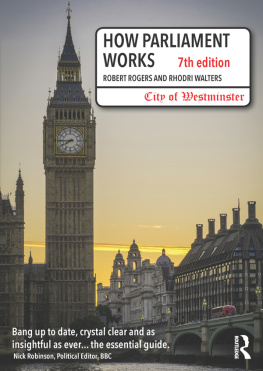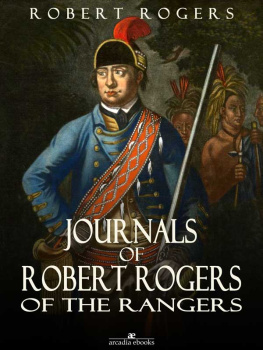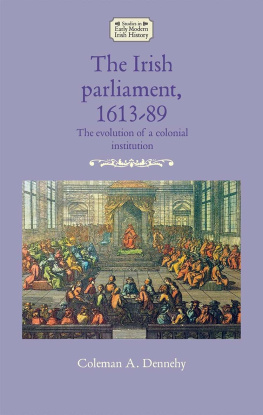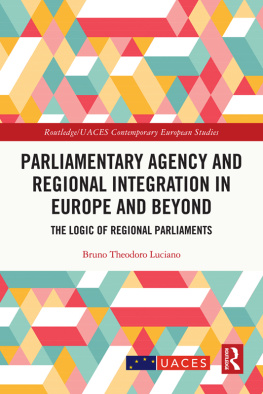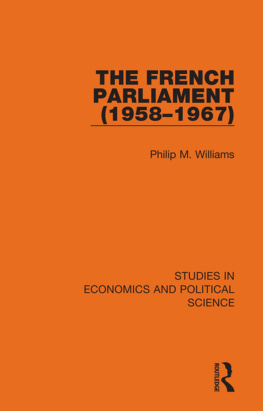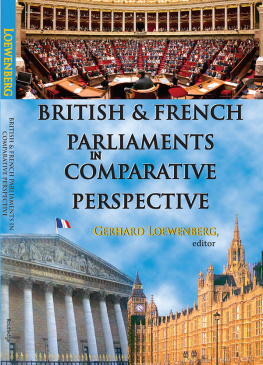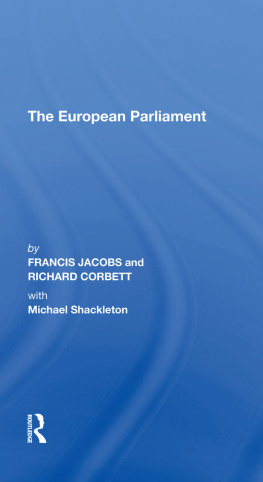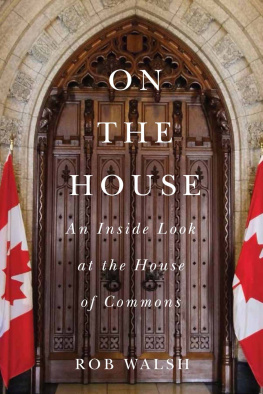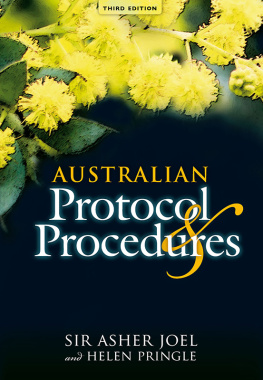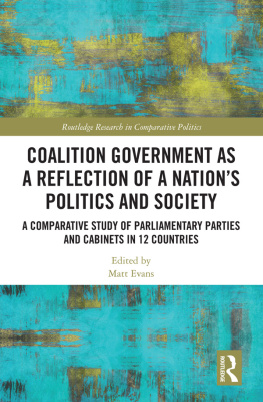How Parliament Works
Written by expert insiders, How Parliament Works is a straightforward and readable analysis of one of the countrys most complex and often misunderstood institutions.
Covering every aspect of the work, membership and structures of both Houses, this key text provides a unique insight into the work and daily life of Parliament. It explains not only what happens but also why, and analyses the institutions strengths and weaknesses, as well as opportunities for Parliament to be more effective.
The seventh edition has been substantially revised to take account of recent changes in both Houses and to cover all the key issues affecting Parliament and politics, such as:
the Fixed Term Parliaments Act;
the implications of coalition politics;
recent developments in Lords reform;
the Independent Parliamentary Standards Authoritys role in pay and expenses;
advances in scrutiny techniques;
changes in parliamentary cycles of business and finance;
member conduct and interests;
reform and modernisation.
It also covers the latest developments in the legislative process, party discipline and rebellion, the procedure of both Houses, select committee work, and the relationship between Parliament and the European Union. All statistics and examples have been fully updated.
How Parliament Works is essential reading for anyone who has anything to do with the Westminster Parliament: journalists, civil servants, lawyers, lobbyists, business and trade associations, diplomats, overseas parliaments and international bodies and, indeed, members of both Houses.
Robert Rogers and Rhodri Walters retired from the service of the House of Commons and the House of Lords respectively, in 2014. Their careers covered every aspect of the work of both Houses and between them they amassed more than 80 years experience of Parliament.
This really is how Parliament works. It is an expert, authoritative and unique insiders view, and essential reading for everyone who wants to know about this complex institution. A truly indispensable book.
Betty Boothroyd (Baroness Boothroyd), Speaker of the House of Commons 19922000
Bang up to date, crystal clear and as insightful as ever How Parliament Works is the essential guide to exactly what it says on the cover.
Nick Robinson, Political Editor, BBC
Always erudite, but never dull, it should be on the shelves of every Parliamentarian, and of everyone who really cares about Parliament. As indispensable as Erskine May, it is a masterpiece.
Patrick Cormack (Lord Cormack) Member of the House of Commons 19702010
Anyone wanting to know what really happens in Parliament as opposed to the widely peddled myths should read this latest edition of How Parliament Works. From a lifetime of experience at Westminster, the authors explain the procedures, powers and role as well as, crucially, the culture and habits in a readable way. No-one should put themselves up as a parliamentary candidate, or become a political journalist, or a senior civil servant, without reading this book.
Peter Riddell, Director, Institute for Government
This is the best introduction known to me and required reading for anyone who wishes to understand the working of Parliament. It is clear, thorough and authoritative.
Vernon Bogdanor, Professor of Government, Kings College, London
How Parliament Works
Seventh edition
Robert Rogers and
Rhodri Walters
First published 1987 by Pearson Education Limited
Sixth edition published 2006 by Pearson Education Limited
Seventh edition published 2015
by Routledge
2 Park Square, Milton Park, Abingdon, Oxon OX14 4RN
and by Routledge
711 Third Avenue, New York, NY 10017
Routledge is an imprint of the Taylor & Francis Group, an informa business
2015 Robert Rogers and Rhodri Walters
The right of Robert Rogers and Rhodri Walters to be identified as authors of this work has been asserted by them in accordance with sections 77 and 78 of the Copyright, Designs and Patents Act 1988.
All rights reserved. No part of this book may be reprinted or reproduced or utilized in any form or by any electronic, mechanical, or other means, now known or hereafter invented, including photocopying and recording, or in any information storage or retrieval system, without permission in writing from the publishers.
Trademark notice: Product or corporate names may be trademarks or registered trademarks, and are used only for identification and explanation without intent to infringe.
British Library Cataloguing in Publication Data
A catalogue record for this book is available from the British Library
Library of Congress Cataloging in Publication Data
A catalog record for this book has been requested
ISBN: 978-1-138-84377-6 (hbk)
ISBN: 978-0-273-79037-2 (pbk)
ISBN: 978-1-315-73087-5 (ebk)
Typeset in Galliard and Frutiger
by Florence Production Ltd, Stoodleigh, Devon, UK
To those who believe that
Parliament matters
Contents
IN THIS SEVENTH EDITION OF How Parliament Works our aims remain the same: to explain a complex, and constantly evolving, national institution in straightforward language; to give an insiders feel for how and why things happen; to analyse strengths and weaknesses; and to examine ways in which Parliament might develop. Parliaments ancient functions of legislating, controlling expenditure, representing the citizen and calling government to account have never been more important; and the more effective Parliament is, the better it will serve its real owners the people of the United Kingdom.
We hope that our readers will include those who have anything to do with Parliament in their daily lives: journalists, lawyers, civil servants, lobbyists, academics, researchers, students and teachers, and, indeed, parliamentary candidates and members of both Houses; and those who simply want to find out how their Parliament works, and what it can do for them.
Eight years have passed since the publication of the previous edition. A great deal has happened at Westminster: the expenses scandal in 2009; a general election resulting in the first peacetime coalition government for 80 years; a frustrated attempt at reforming the House of Lords; and a bewildering amount of political and procedural change in both Houses. Some 40 per cent of this new edition has been updated or, indeed, completely rewritten to keep pace. Previous editions of this book surveyed the devolved Parliament and Assemblies, and their relations with Westminster. Time has moved on, they have matured and developed, and so they are not covered in this edition.
We retired from the service of the Commons and Lords in 2014 with a total of 80 years in the service of Parliament. With an eye to the future, the preparation of this edition has been more widely collaborative. We are hugely grateful to the expert and enthusiastic colleagues who have helped with this edition, and our special thanks go to: Nicolas Besly, Paul Bowers, Sarah Davies, Mark Egan, Tom Goldsmith, Luke Hussey, Tracey Jessup, Richard Kelly, Colin Lee, Ed Little, Simon Patrick, Ed Potton, Crispin Poyser, Fergus Reid, Eve Samson, Isobel White and Huw Yardley.
We are also most grateful to James Bowyer, Paul Bristow, Alexander Brocklehurst, Christopher Clarke, Mark Cooper, Mark Davies, Paul Evans, Anna Murphy, Danielle Nash, Arnold Ridout, Duncan Sagar, Jonathan Smith, Joey Topping, Jake Vaughan, Ben Williams, Anthony Willott and Tom Wilson. The responsibility for any error or omission is of course our own.

